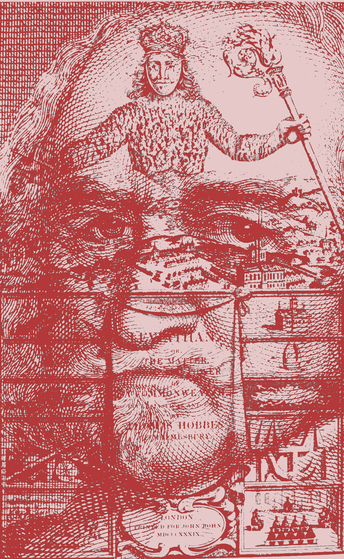Thomas Hobbes1588–1679
Hobbes was a political philosopher who saw an understanding of human nature as essential to an appreciation of government. Although he served briefly as Bacon's secretary, he did not adopt the method of inductive science but was more attracted to the deductive method that had been applied with such success in astronomy. Hobbes considered that all nature consisted of matter in motion and, as parts of nature, humans were machines, too. In his introduction to Leviathan (1651) he wrote "For seeing Life is but a motion of limbs, the beginning whereof is in some principall part within; why may we not say, that all Automata (Engines that move themselves by springs and wheeles as doth a watch) have an artificiall life? For what is the Heart, but a Spring; and the Nerves, but so many Strings; and the Joints, but so many Wheeles, giving motion to the whole Body, such as was intended by the Artificer?" Hobbes painted a pessimistic picture of human nature. Humans were said to be motivated by self-interest, seeking quarrels with one another because of the desire for power. These were taken to result in each individual striving for their own advantage and at war with one another, thereby living in "continuall feare, and danger of violent death; And the life of man, solitary, poore, nasty, brutish, and short... The Passions that encline men to Peace, are Feare of Death; Desire of such things as are necessary to commodious living; and a Hope by their Industry to obtain them". Government is required to keep such forces in check and, for Hobbes, the most appropriate form of rule was by sovereign power. Hobbes laid the foundations for empiricist philosophy. He placed the senses as the source of all knowledge: "there is no conception in a mans mind, which hath not at first, totally, or by parts, been begotten upon the organs of Sense". In this regard, his empiricist ideas were in direct conflict with Descartes's dualism. Hobbes also presented a fledgling theory of association. The "Trayne of Thoughts" was a consequence of their coherence (or simultaneous occurrence) and could be random or regulated; the latter were guided by desire and habit, and associations could be strengthened by frequent repetition. Hobbes was educated at Oxford and served for much of his life as tutor to various Dukes of Devonshire. In this capacity he made three grand tours of Europe, meeting Galileo and Descartes, as well as other French philosophical luminaries. Hobbes's long life saw the founding of the Royal Society in London, from which he was excluded primarily on the basis of his unorthodox political and religious beliefs. Hobbes is portrayed as part of the Leviathan, the macrocosm of the state that is inseparable from the microcosm of man: "the multitude so united in one person, is called a Commonwealth... This is the generation of that great Leviathan".
